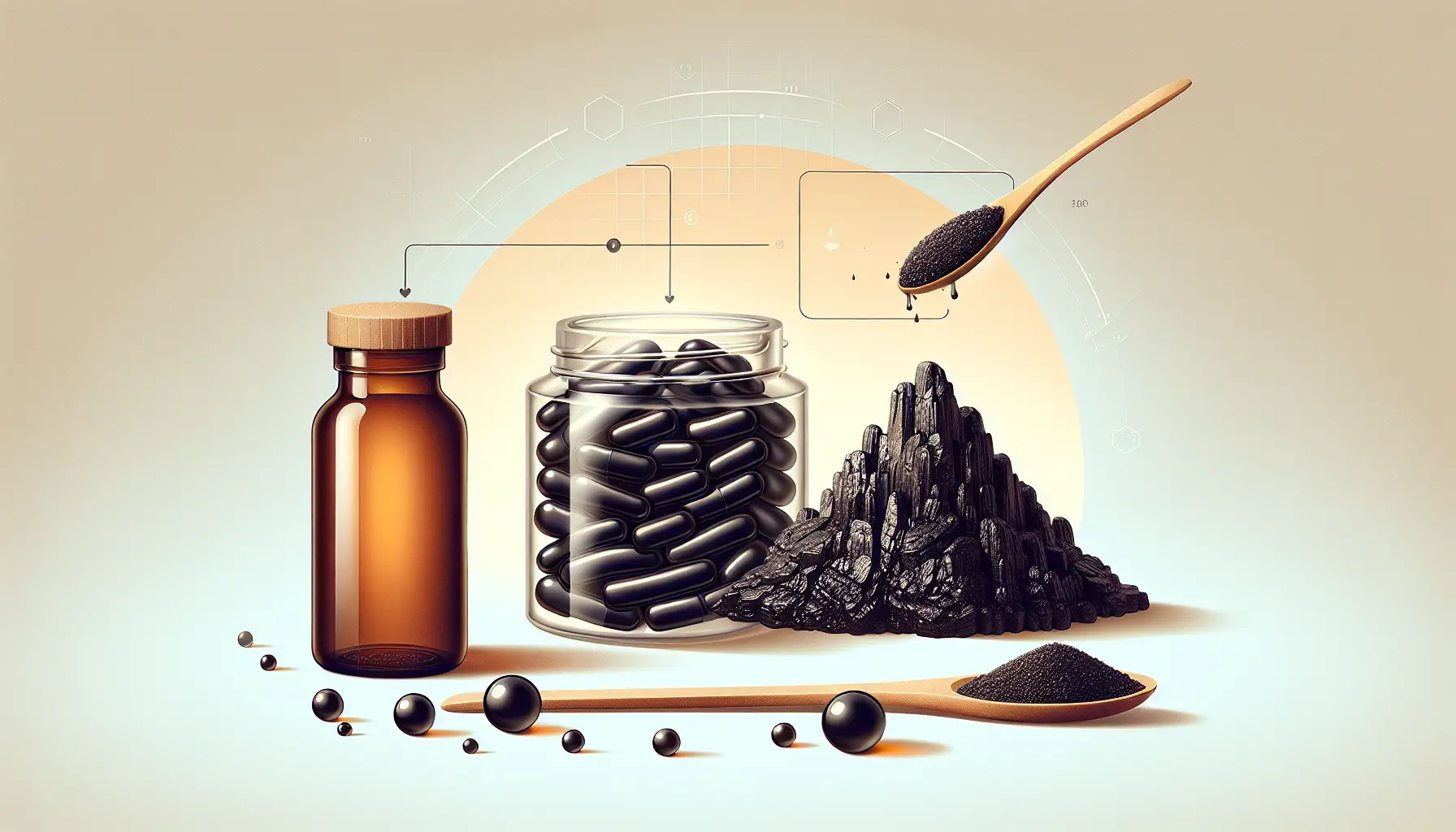Shilajit is available in both capsule and resin form, but which is best?
This article will explain the key differences and benefits of each form and help you to make an informed choice between shilajit capsules vs resin.
Key Takeaways
- Shilajit is a mineral-rich resin used in Ayurvedic medicine, known for its health benefits, including energy boost, cognitive enhancement, and anti-ageing properties.
- The two main forms of Shilajit, capsules and resin, offer different pros and cons: capsules are convenient and easy to consume, while resin provides higher potency and a more traditional experience.
- The efficacy of Shilajit can depend on its form, with resin generally exhibiting superior bioavailability.
What Is Shilajit?
Shilajit is a mineral-rich resin that has been used in Ayurvedic medicine for centuries.
This sticky substance, which is collected from the rocks of the Himalayas and other mountain ranges, is formed from the slow decomposition of plant matter over centuries.
It’s rich in fulvic acid, humus, and over 84 minerals, making it a potent natural supplement.
The formation process of Shilajit results in a substance rich in nutrients that are essential for our health.
The high concentration of fulvic acid in Shilajit plays a crucial role in enhancing nutrient absorption and delivering various health benefits.
Shilajit provides a natural way to boost energy levels, enhance cognitive function, and support overall well-being, thanks to its essential minerals.
Traditional Uses of Shilajit
Shilajit has been traditionally used for its ability to treat a myriad of health conditions.
It may enhance aspects such as overall health and longevity, with practitioners of Ayurveda prescribing it for ailments ranging from digestive issues to chronic fatigue.
The anti-aging properties of Shilajit are particularly noteworthy, as it is believed to rejuvenate the body and mind, promoting a longer, healthier life.
Shilajit has also been useful in helping to relieve the severe symptoms of altitude sickness. These symptoms include insomnia, headache, nausea, and fatigue. This makes it a valuable supplement for those who travel or live at high altitudes.
Forms of Shilajit: Capsules vs Resin
When it comes to modern consumption, Shilajit is available in two primary forms: capsules and pure Shilajit resin. Each form has its own benefits and drawbacks.
Capsules provide a convenient, pre-measured dose, perfect for those with busy lifestyles.
On the other hand, the resin form is a pure, sticky extract that often requires preparation but offers a more concentrated dose of nutrients.
Understanding the differences between these forms is crucial for making an informed decision about which one suits your needs best.
While capsules are easy to consume and carry, the resin offers a more traditional experience with potentially higher potency.
This section will reveal the specifics of each form, helping you weigh the pros and cons.
Shilajit Capsules
Shilajit capsules are much more convenient to use. These pre-measured doses eliminate the need for preparation, making them an ideal choice for those with hectic schedules.
At BROWN’S HEALTH, our Shilajit capsules contain 100% powdered Shilajit extract, ensuring that you receive the full spectrum of benefits without any unnecessary fillers.
Capsules are favored for their practicality, offering a hassle-free way to incorporate Shilajit into daily routines, whether traveling, at work, or avoiding the resin’s stickiness.
Choosing high-quality capsules ensures you receive the maximum benefits from this powerful supplement.
Shilajit Resin
Shilajit resin, on the other hand, is the traditional form of this ancient remedy.
This pure, sticky extract is typically dissolved in warm water or milk before consumption, which can enhance its absorption and effectiveness.
The process of preparing the resin might seem labour-intensive, but many users believe the effort is worth it for the higher potency and traditional experience.
Consuming Shilajit resin allows you to connect with its historical roots, offering a more authentic experience.
This form is often preferred by those who prioritise the purity and concentration of their supplements.
Dissolving it in a liquid ensures that the nutrients are readily absorbed, maximising Shilajit’s health benefits.
Health Benefits of Shilajit
Shilajit’s vast and varied health benefits make it a popular choice for those seeking natural health improvements. Rich in minerals, antioxidants, and fulvic acid, Shilajit supports overall health and helps prevent disease. Its anti-inflammatory and immune-modulating properties further enhance its appeal as a comprehensive health supplement.
From boosting exercise performance to improving male fertility, Shilajit offers a range of potential health benefits that cater to different health needs. Although more clinical research is needed to confirm all health claims, traditional use and preliminary studies suggest Shilajit is a valuable addition to any wellness regimen.
Comparing Effectiveness: Capsules vs Resin

When comparing the effectiveness of Shilajit capsules and resin, several factors come into play.
The resin form is generally considered more potent due to its higher concentration of bioactive compounds, but it is also more challenging to dose and use.
Capsules, while convenient, may have lightly lower potency if not made from high-quality Shilajit extract.
The debate over which form is best continues, with users reporting varying absorption rates and personal preferences. Ultimately, choosing between capsules and resin depends on individual needs and lifestyle.
Bioavailability
Bioavailability is an important factor when considering the effectiveness of Shilajit.
The resin form, being less processed, often exhibits superior bioavailability, leading to faster absorption of its beneficial substances. This means that you might need a smaller amount of resin to achieve the same effects as a larger dose of capsules.
However, some believe that capsules can also offer high bioavailability if they are well-formulated and contain high-quality Shilajit extract.
The convenience of capsules makes them an attractive option for many, despite the potential differences in absorption rates.
Dosage
Correctly determining Shilajit’s dosage maximises its benefits while ensuring safety.
Processed Shilajit is considered safe when consumed in amounts up to 2 grams daily for a duration of 45 days. However, consulting a healthcare professional before starting any new supplement regimen is always advisable.
Shilajit supplements come in various forms, including dissolvable powder and capsules, each with its own recommended dosages as a dietary supplement.
Gradually increasing the dosage can help mitigate any initial adverse effects and allow your body to adjust to the supplement.
Following the dosage instructions provided by the manufacturer or healthcare provider ensures safe and effective use.
Common Side Effects
While Shilajit is generally well-tolerated, some users may experience side effects.
These can include digestive issues such as diarrhea or vomiting, particularly when increasing the dosage too quickly.
In rare cases, Shilajit may cause severe allergic reactions, such as anaphylaxis, in sensitive individuals.
Monitoring your body’s response to Shilajit and adjusting the dosage accordingly is important. If you experience any adverse effects, discontinue use and consult your healthcare provider promptly.
Potential Contaminants
One critical consideration when choosing Shilajit products is the potential for contamination.
Unprocessed Shilajit can contain harmful levels of heavy metals, which pose serious health risks. Selecting high-quality Shilajit that has undergone rigorous safety and purity testing is crucial.
Seek reputable brands offering transparency through third-party testing and certifications. Investing in high-quality Shilajit protects your health and ensures you receive the full range of benefits this powerful supplement offers.
Summary
In summary, Shilajit is a potent natural supplement with a rich history in Ayurvedic medicine, offering a wide range of health benefits.
Whether you choose capsules for their convenience or resin for its traditional potency, understanding the differences and how to use them effectively is key to maximising their benefits.
Remember to consider factors such as bioavailability, dosage, and potential contaminants.
By making informed choices, you can harness the full power of this ancient remedy to enhance your health and well-being.
Embrace the wisdom of Ayurveda and make Shilajit a part of your daily regimen for a healthier, more vibrant life.
Other health supplements that you may find interesting are:
- Tongkat Ali Capsules
- Curcumin Capsules
- Lion’s Mane Capsules
- Ashwagandha KSM-66 Capsules
- Magnesium Capsules
Frequently Asked Questions
What is Shilajit, and how is it formed?
Shilajit is a mineral-rich resin that forms from the slow decomposition of plant matter beneath rocks over centuries. It contains fulvic acid, humus, and more than 84 essential minerals.
What are the traditional uses of Shilajit in Ayurvedic medicine?
Shilajit has been traditionally utilized in Ayurvedic medicine to treat various ailments, boost overall health, and alleviate altitude sickness. Its diverse applications highlight its significance in holistic healing practices.
What are the main differences between Shilajit capsules and resin?
Shilajit capsules provide convenience and are pre-measured for easy consumption, whereas resin is a more potent form that requires preparation and must be dissolved in a liquid. Therefore, the choice depends on your preference for ease of use versus potency.
How does Shilajit support cognitive health?
Shilajit supports cognitive health primarily due to its high fulvic acid content, which serves as an antioxidant to protect brain cells from damage. Additionally, preliminary studies indicate that it may help in preventing Alzheimer’s disease.
What should I consider when choosing a Shilajit supplement?
When choosing a Shilajit supplement, it is crucial to consider bioavailability, potential contaminants, and the brand’s reputation. Opt for products that have third-party testing seals and certifications to guarantee safety and purity.



